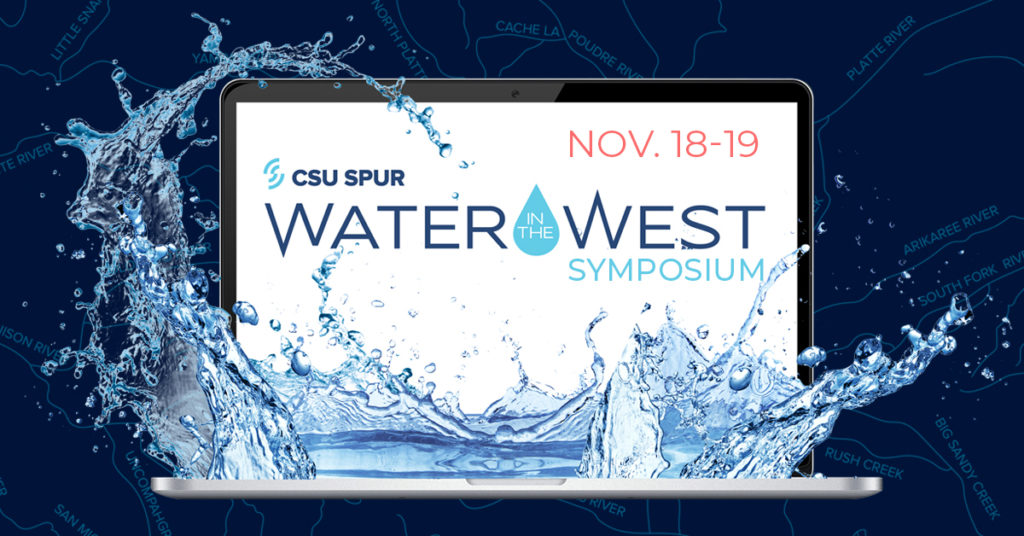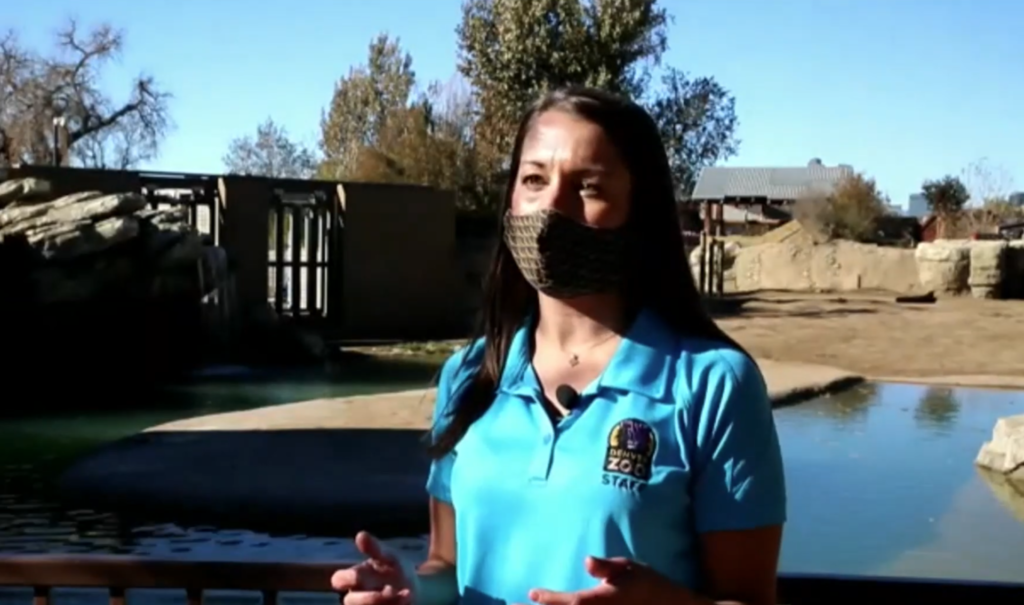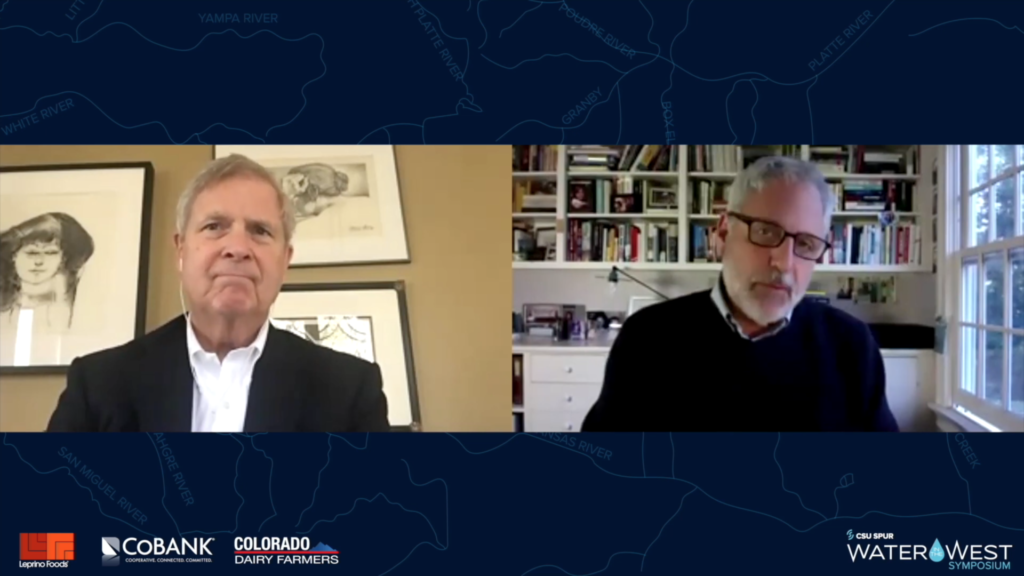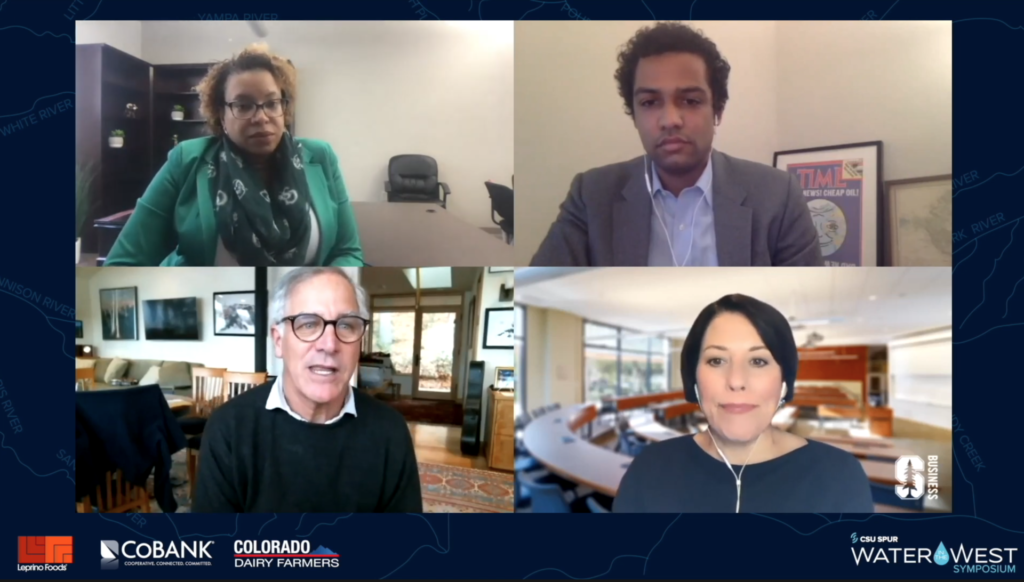
“This year, our theme is the power of story, and we are bringing together experts on stories and change from various backgrounds,” said Jocelyn Hittle, CSU System assistant vice chancellor for the Spur campus and special projects, welcoming attendees to the third annual — and first virtual — CSU Spur Water in the West Symposium, an offering of the CSU Spur campus opening in 2022 at the future National Western Center in north Denver.
“Our hope is that you will take with you tools and insights for how you can engage more people, whether they are friends, family, or decisionmakers, on the issues of water through stories that capture their attention and imagination,” Hittle said.
While COVID-19 restrictions limited the event to a virtual format, it also enabled participation from a more geographically diverse group of speakers, including multiple western governors and more than 320 attendees representing nearly 90 unique zip codes across 12 states.
This year’s program focused on the critical role of storytelling in building social and environmental movements — specifically, how stories and media campaigns can boost public awareness and inspire actions that address and solve water-related issues.

The Symposium began with virtual tours and live Q&A sessions with CSU Spur partners Denver Zoo and Denver Water, showcasing each organization’s respective sustainability efforts to reduce waste, conserve water, and mitigate wildfires.
Before the formal program began, Ty Smith, director of the Native American Cultural Center at CSU, delivered the University’s official land acknowledgment, grounding attendees in a shared appreciation for the relationship between land and people: “Native people recognize that everything has a spirit — plants, animals, insects, mountains, and water, which brings us together today. Tó éí ííńá, which in my language means ‘water is life.’”
The power of story
CSU System Chancellor Tony Frank also offered opening remarks, helping set the tone for the event.
“The stories shared and conversations sparked at Water in the West are even more important today than they were a year ago when we convened in person,” said Frank. “Today we continue the work of the Water in the West Symposia, connecting across disciplines, across sectors, across the country, to learn how we can all be more effective in our work to elevate water challenges in the local and national consciousness.”
Gary Knell, chairman of National Geographic Partners, delivered the Symposium’s keynote address on the power of storytelling, drawing from his experience coordinating the production of science-based, impactful content.
“The best stories take the relevant facts and present them in ways that, deep down, people can understand,” said Knell, acknowledging National Geographic’s longstanding connection to the American West and water issues specifically, dating back more than 150 years.
“While we stand unequivocally on the side of science, we make a concerted effort to emphasize the universal nature of the issues we cover, and how they connect to the lived experiences of diverse audiences everywhere,” he said. “And there is perhaps no issue more universal than water.”

Former U.S. Secretary of Agriculture Tom Vilsack (left), a strategic advisor on CSU Spur’s food and water initiatives, joins Gary Knell (right) to address audience questions.
Moving minds, crossing sectors
Yolanda Bevill, CSU’s vice president for University Communications moderated the “Moving Minds: How Social Movements, Campaigns, and Storytelling Shape Public Sentiment” panel, with Gary Hirshberg, cofounder and chairman of Stonyfield Organic, Sarah Soule, Morgridge Professor of Organizational Behavior and senior associate dean for academic affairs at Stanford Graduate School of Business, and Justin Worland, who writes for TIME on energy, climate, and the environment.
Hirshberg shared his advice from years of experience crafting and deploying communications strategies for Stonyfield, and highlighted some of the barriers he and his company had faced around encouraging consumers to buy organic — challenges ultimately overcome through engaging, light-hearted marketing campaigns.
“Keeping it upbeat, keeping it positive — that too goes a long way,” said Hirshberg, emphasizing the value of “visceral, visual, less self-serious storytelling,” across all platforms and social media especially.

Worland shared his perspective as a journalist covering global issues around finding common ground to appeal to and connect with TIME’s diverse, national readership.
“A lot of the work I do is building little pieces for a bigger arc of a narrative that over time will, perhaps, lead to some form of social change,” said Worland. “Not every story is going to change the world, but you’re building those blocks.”
Soule anchored the conversation with findings from her research in organizational theory, social movements, and political sociology.
“When a social movement frame tells a story and evokes an emotion, it’s likely to resonate with policymakers and be more successful,” she said.
Secretary Vilsack moderated the “Food and Water: A Cross-Sector Conversation” panel, with David LaFrance, CEO of the American Water Works Association, and Karen Ross, Secretary of the California Department of Food and Agriculture.
“I take away from your comments today the importance of elevating an understanding of the role water plays in each of our lives day-to-day,” Vilsack said, noting the importance of collaborative partnerships in addressing water challenges as they relate to climate change, the pandemic, and justice and equity issues.
Precipitating dialogue, inspiring action
Day two of the Symposium focused on inspiring decisionmakers and elected leaders to act on water-related issues, with remarks from multiple western governors, beginning with Colorado Governor Jared Polis who provided a comprehensive update on the Colorado Water Plan and other statewide initiatives to conserve and protect the state’s rivers and watersheds.
“Given the importance of water to our future, it’s critical that all of Colorado’s leaders go about overcoming today’s challenges — and preparing for tomorrow’s — in a bipartisan, thoughtful way,” said Polis. “In Colorado, we focus on collaboration and balance with regard to water solutions that involve everyone from across our state doing their part.”
A conversation between David Axelrod, founding director of the University of Chicago Institute of Politics and former chief strategist to President Barack Obama, and Secretary Vilsack helped conclude the 2020 Symposium, reemphasizing the importance of engaging policymakers and the general public through story and shared media.
“You have to persuade people that water isn’t always going to come out of the tap,” Axelrod said. “This has to be made accessible to people; that way, if actions need to be taken, they have a sense of why.”
About CSU Spur
In 2022, the CSU System will open CSU Spur, where innovative ideas and unforgettable experiences come to life at the National Western Center. CSU Spur’s three buildings at the center of the landmark project in north Denver will ignite and fuel new ideas around water, food and health and their impact on our lives and our world. Spur is where learning is open and accessible to all. Where researchers tackle the world’s most pressing problems around water, food and health. Where art and culture challenge and surround you. Where rural and urban, local and global intersect. Learn more at csuspur.org.